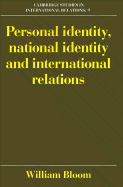Book contents
- Frontmatter
- Contents
- Preface
- 1 The problem stated and a review of politically applied psychological theory
- 2 Identification theory – its structure, dynamics and application
- 3 Nation-building
- 4 The national identity dynamic and foreign policy
- 5 Identification and international relations theory
- 6 Conclusion – appraisal, prescriptions, paradoxes
- Notes
- Index
1 - The problem stated and a review of politically applied psychological theory
Published online by Cambridge University Press: 01 June 2011
- Frontmatter
- Contents
- Preface
- 1 The problem stated and a review of politically applied psychological theory
- 2 Identification theory – its structure, dynamics and application
- 3 Nation-building
- 4 The national identity dynamic and foreign policy
- 5 Identification and international relations theory
- 6 Conclusion – appraisal, prescriptions, paradoxes
- Notes
- Index
Summary
INTRODUCTION
The major popular image of world politics is that it consists of the relationships and interactions of nation-states. There may indeed be other major actors – class, multinational corporations or transnational bodies – but on the stage of world political action, the roles of these actors appear complementary, subservient, out of the limelight. It may indeed, for example, be class forces in the form of covert centre–periphery relations which determine a developing state's internal economic policy and external foreign policy – but the form in which these effects and decisions appear is that of the nation-state.
Implicit in this image of nation-states being the major international actors is a further more subtle image. This more subtle image is based in the political norm – and if not the norm, then certainly the assumption – that state power rests in a popularly legitimised authority. There may be no formal or recognisable form of democratic participation, but nevertheless the state, it is thought, should be one with the people who are its nation. International politics, then, is not simply the relations between state structures, but is also the relations between the nations. In international politics, people, government and state fuse into one image.
- Type
- Chapter
- Information
- Publisher: Cambridge University PressPrint publication year: 1990



